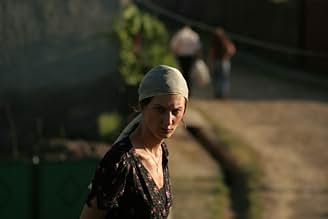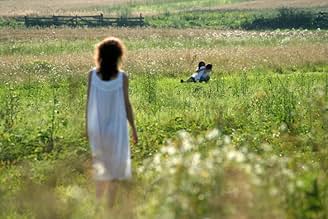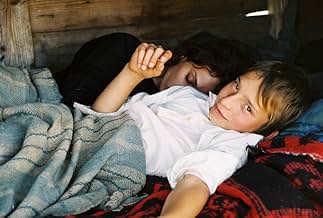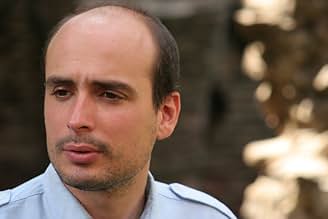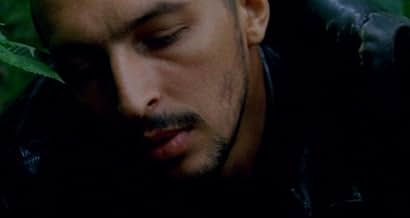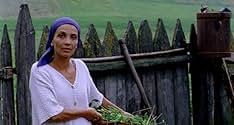Katalin Varga
- 2009
- 1 h 22 min
AVALIAÇÃO DA IMDb
7,0/10
3,2 mil
SUA AVALIAÇÃO
Adicionar um enredo no seu idiomaKatalin, a woman raped in the Carpathian Mountains, seeks revenge with a boy, questioning morality's complexities as she confronts her past.Katalin, a woman raped in the Carpathian Mountains, seeks revenge with a boy, questioning morality's complexities as she confronts her past.Katalin, a woman raped in the Carpathian Mountains, seeks revenge with a boy, questioning morality's complexities as she confronts her past.
- Prêmios
- 14 vitórias e 16 indicações no total
Tibor Pálffy
- Antal Borlan
- (as Tibor Pálfy)
Avaliações em destaque
Having already seen and very much enjoyed this director's Berberian Sound Studio and prior to seeing his latest, The Duke Of Burgundy, decided to check out this, his first feature. Glad I did, seems it didn't get a theatrical release in UK, which is a travesty. Great little film, very focused, very intense, with a stunning central performance from Hilda Peter. Problems in her village prompt her to take off with her son and traverse the Carpathians and maybe exorcise her devils. Always very good to look at, this also has what has become a Strickland trademark, amazing score. The tinkling cowbells, echoing across the fields or the creak of the horse and cart carrying them both find their way unobtrusively into the score. Always engrossing, the central sequence where the main character explains graphically what happened to her as their boat slowly spins on a lake is spellbinding and so very effective. Excellent.
Peter Strickland's debut movie Katalin Varga reminds me very much of another recent British film, Asif Kapadia's 2007 effort Far North, which is also a folk horror story about an outcast and her child. Stickland uses the dank forest of Romania instead of the perilous ice flows of the north, but the movies are birds of a feather, low budget movies intended to tap primal energies.
Children run away from Katalin Varga, a darkly pretty woman with live-wire eyes, who's altogether too spirited to remain unmolested in the time-capsuled world with which the movie presents te viewer. Folk have mobile phones, but Katalin still travels by horse-drawn cart, and men still make hay in the fields with pitchforks. Gossip in Katalin's village is poisonous enough to make Clouzot's vision in Le Corbeau appear positively made of marshmallow. Following the repurcussions of gossip regarding Katalin's past, she travels with her child into an apparently infrastructure-less hinterland on a dark mission, like black lightning.
It's no surprise to find, following shot after shot of foreboding nature scenes, that this is a tragedy, in a cul-de-sac structure similar to Monte Hellman's brilliant 1965 movie Ride in the Whirlwind.
It's a brutal movie, in structure rather than in screen violence, which there is remarkably little of, and which is generally obscured in incoherence when it occurs. It's almost senseless and left me with a directionless primitive anger.
Children run away from Katalin Varga, a darkly pretty woman with live-wire eyes, who's altogether too spirited to remain unmolested in the time-capsuled world with which the movie presents te viewer. Folk have mobile phones, but Katalin still travels by horse-drawn cart, and men still make hay in the fields with pitchforks. Gossip in Katalin's village is poisonous enough to make Clouzot's vision in Le Corbeau appear positively made of marshmallow. Following the repurcussions of gossip regarding Katalin's past, she travels with her child into an apparently infrastructure-less hinterland on a dark mission, like black lightning.
It's no surprise to find, following shot after shot of foreboding nature scenes, that this is a tragedy, in a cul-de-sac structure similar to Monte Hellman's brilliant 1965 movie Ride in the Whirlwind.
It's a brutal movie, in structure rather than in screen violence, which there is remarkably little of, and which is generally obscured in incoherence when it occurs. It's almost senseless and left me with a directionless primitive anger.
The beautiful Transylvanian countryside, where a thin veil of modernity covers a continuing peasant lifestyle for many, is the setting for Peter Strickland's short, unsentimental film 'Katalin Varga' about the aftermath of a rape. It's a quiet movie, strikingly shot, that offers no pretence of life easier than it actually is. To me, it seemed that the reaction of the perpetrator's wife seemed simultaneously slightly overdone (in terms of motivation) and underplayed; one might also suggest that the ending is not especially satisfying, probably because the film never lets us know exactly what it is that Katalin is hoping for. This can be justified, however, because it's completely plausible that the character doesn't know herself. In a nutshell, this is a revenge movie; but so much more interesting that most of what we see in this genre.
I missed this first time round and am so glad I caught up with it at an afternoon showing at a local independent cinema. Even more encouraging was that I expected to be the only person there but, although only a smattering of people (in a large auditorium), there were enough to create an atmosphere (that may be in my head but hopefully some people will get what I mean). So, transfixed by Hilda Peter from the outset, the film moved beautifully through dreamy countryside as the revelation of a hidden secret drove Katalin and her son away from their marital home. The menacing undertone haunted their journey to remote villages, the audience waiting for the inevitable vengeance to erupt. The nature of the film and its brutal climax prompted something I love to see as the credits rolled. No one moved or spoke. If the audience is out of their seats the second the picture fades I feel either they're relieved the film has finished or have weak bladders or a drink problem. Katalin Varga was successful in conquering the audience, an endorsement of its quality. See it.
Great, atmospheric effort from Strickland. I can only imagine he had some affinity with this part of Romania whether from childhood or other. The soundtrack and some of the slow lingering shots (esp. the scene looking at child, mother and horse not moving from behind, and the forest shot) were very affecting, and reminded me of Tarkovsky (not in a bad way ;)I got to thinking of the inextricable nature of all things, of how everything (as a single glorious 'entity') was so deviously and religiously bound up that to even attempt to extract something from it was tantamount to destructuring the whole (and thus destroying its royalty). That a film can inspire me (it has to be said not single-handedly)to such ends is indicative of a deep metaphysical quality within it.There is a particular sentence that the man utters towards the end of the film that resonates deeply towards this metaphysis. I shan't explicate it, nor even repeat it, but you shall know it when you hear it.
Thanks for this Strickland, and all who were involved in and outside it (even the guy who carted the extra film stock when, presumably, you ran out ;) 'Ultimately, there are no parts at all.' Fritjof Capra, The Web of Life.
Thanks for this Strickland, and all who were involved in and outside it (even the guy who carted the extra film stock when, presumably, you ran out ;) 'Ultimately, there are no parts at all.' Fritjof Capra, The Web of Life.
Você sabia?
- CuriosidadesThe film was shot in Romania in July 2006 for around £25,000 with a small crew of 11 people (including transport and catering). Strickland paid everyone on the 17-days-shoot himself, apart from the focus-puller, who agreed to work for free. The whole crew and the actors lived together in an empty house in a small village in the Carpathian Mountains. After the shoot Strickland ran out of money while editing. He approached many UK production companies, but the reaction was always negative because an obscure film by an unknown director, not even in the English language, seemed to put off all UK investors. Only two Romanian producers, Oana Giurgiu and Tudor Giurgiu, paid attention. They saw Strickland's rough cut and came on board as co-producers, providing the funds to make a proper sound-mix and a blow-up from the Super-16mm negatives to 35mm. It was then invited and shown in competition at the '59th Berlin International Film Festival' in 2009 and won the 'Outstanding Artistic Contribution' award for the creative sound design. Without the Romanian producers, the film would never have been properly finished.
- Trilhas sonorasThe Grave and Beautiful Name of Sadness
- excerpts taken from "The Sadness of Thing"
Written by Steven Stapleton and David Tibet
Performed by Steven Stapleton and Geoff Cox
Principais escolhas
Faça login para avaliar e ver a lista de recomendações personalizadas
- How long is Katalin Varga?Fornecido pela Alexa
Detalhes
- Data de lançamento
- Países de origem
- Central de atendimento oficial
- Idiomas
- Também conhecido como
- 卡塔琳的秘密
- Locações de filme
- Empresas de produção
- Consulte mais créditos da empresa na IMDbPro
Bilheteria
- Faturamento bruto mundial
- US$ 28.399
- Tempo de duração1 hora 22 minutos
- Cor
- Mixagem de som
- Proporção
- 1.85 : 1
Contribua para esta página
Sugerir uma alteração ou adicionar conteúdo ausente



